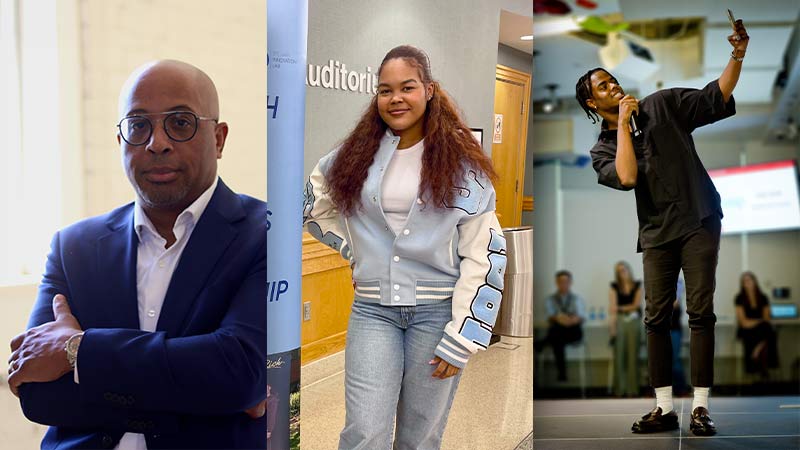A talent ecosystem for Black entrepreneurs
How the Center for Black Entrepreneurship models building an economic ecosystem that eliminates the access barrier for the next generation of black entrepreneurs

While more than 20% of African American adults believe that business ownership is key to financial success, Black-owned businesses continue to represent a small proportion of total companies and income.1
The Center for Black Entrepreneurship (CBE) hopes to change that.
“We often hear about people building pipelines for talent, innovation, and success, but because they are disconnected from each other, these pipelines often lead to nowhere,” says Dr. Grant Warner, Director of the CBE. “That’s why the CBE is focused on creating new and holistic ecosystems to support the next generation of Black entrepreneurs, surrounding them with the kind of networks, mentorship, training and support that are critical for success.”
How CBE created a talent ecosystem
Fueled by Visa Foundation’s support, the Black Economic Alliance Foundation (BEA), Spelman College, and Morehouse College founded the CBE. It seeks to remove the barrier between Black entrepreneurs, professional investors, and business builders through education, mentorship, access to capital and opportunity.
For Farra Muhammed, a Junior at Spelman College, and Gera Baano-Stewart II, a Senior at Morehouse College, the opportunities have been transformational.
“CBE walks us through the entrepreneurial journey such as building a network, the support system, the marketing, everything that it takes to bring a product to market,” says Muhammed, now the President of a campus social entrepreneur club, a Stanford Innovation Fellow, and an app developer. “[CBE] walks us through every phase and exposes us to the resources, the opportunities, even the investors who will help bring an idea to reality. Once they expose us to those people, though, those people need to know we’re capable of doing it. The CBE gives us the tools to make sure we are.”
For the 500+ student participants in the nearly two years since the CBE was established, those tools have taken the form of co-curricular programming, capstone classes, pitch competitions, and even an entrepreneurship minor — all of which have helped foster a new talent ecosystem and given individual participants a launchpad for their own big ideas.
“I’ve won five pitch competitions in the past year. I’ve launched a social/dating app that’s grown to 30,000 users in one year. Thanks to the mentors and people the CBE connected me with, I was able to tap into their expertise to develop a good business and see success,” says Baano-Stewart. “But more than that, it’s helping me build those investor relationships and maintain them over time.”
Looking to the Future
The success of the CBE in just shy of two years is more than encouraging — and more than an opportunity for those directly participating. It’s a model for cities across the nation — an example of how public-private partnerships can serve as a catalyst for investment and opportunity.
“The CBE can serve as a model for how Historically Black Colleges and Universities (HBCUs) can become an economic development engine for its surrounding community, facilitating inclusive economic transformation,” says Dr. Warner. “The key is building stronger ecosystems around HBCUs. The BEA has initiated that process with the formation of the CBE.”
As for Muhammed and Baano-Stewart, each has big ambitions for themselves and their businesses.
“My goal is to build a combination beauty bar/Pilates studio,” says Muhammed, “because I think we need to value wellness, self-love, and self-care — and make it as accessible and easy as possible.”
For Baano-Stewart? The dream is Forbes.
“You don’t see too many Black tech entrepreneurs on the Forbes list,” he says.
“My goal is to be the MJ of tech. I want to be the go-to in that sector. I want to be and will be a global leader.”
Learn more about Visa Foundation and how the Center for Black Entrepreneurship is working to create a more equitable and inclusive future for all.
1 https://www.pewresearch.org/short-reads/2024/02/16/a-look-at-black-owned-businesses-in-the-us/